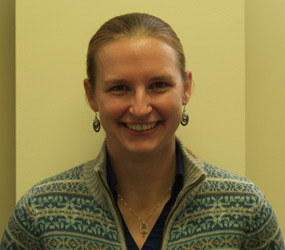What do you think will be your biggest challenges over the next five years?
“They will be the same challenges that librarians everywhere will be facing. One challenge is promoting our growing ebook collection. Most researchers have come to expect that our journal subscriptions will be digital but they don’t always realize that we have a large number of high-quality ebooks available too. I think that they will grow used to seeing fewer books on shelves and become increasingly reliant on getting the information that they need seamlessly online from wherever they are. The challenge of collection management has always been to have the materials that patrons want. Patron-driven acquisitions and evaluating use of subscriptions help us make meaningful purchases and decisions but the choices are not always as straightforward as one would want them to be!”
How can librarians encourage students to visit the library?
“Oh I love this question! Talk to them, offer tours, visit their classes, go to orientation and every event fair that you can get into. We do a short presentation at orientation that every incoming student sees. It’s not a long class on how to find information, but a short “hi” that highlights our services and gives a personal face to the libraries. Additionally, we offer tours during orientation time and during the first few weeks of classes. I visit the lab sections of university Physics I and II to introduce the physics library to those freshmen and I know several of my colleagues do the same for their disciplines. Many freshmen are overwhelmed by life on campus and our main library can be an intimidating place – until they actually step inside! At event fairs we talk to students to let them know how the libraries can help them be academically successful and we stress that there is a librarian specifically assigned to their area of study. We have “trading cards” in place of formal business cards to hand out to students. It lets the students know that there is a real person to assist them!”
What piece of advice would you pass on to new colleagues just starting their librarianship?
“Particularly for academic librarians, get out and get to know the rest of campus. It’s easier to connect to students when you can mention other services that might be useful, like the tutoring or writing center. It helps you feel connected to the larger mission of the institution. I love helping out at events around campus as well, such as move-in day. Moving away from home can be exciting … and scary. Being a friendly face that they see on their first day can help students feel more at ease (and it’s great when they see you again in the library or visiting their class!) Likewise, if you are at a large institution, get to know the other departments in the library or libraries. Knowing who you are working with can make you feel more connected to the organization. And ask lots of questions; librarians love to share information and it helps you learn!”
In your opinion, what is the best thing about being a librarian?
“I love working with students. When a student tells me that what we’ve found together is “exactly what I needed” it makes my day. I also love when students drop back in just to tell me how well they did on their paper. We have a lot of graduate students who use the physics library and we’ve been able to make several changes based on their needs, including making collections more accessible and creating a silent study space. I love hearing them tell us how those changes have made a positive impact on their learning and research.”
What was the last book you read and what do you recommend reading?
“The last book I read was The Working Poor: Invisible in America by David K. Shipler. It was the book that was chosen for our campus One Book, One Community project this past fall, and it gives a very personal look at several of the factors in American poverty. There are many books I could recommend reading, but I’ll try to just pick a few. A Walk in the Woods: Rediscovering America on the Appalachian Trail by Bill Bryson is an absolutely hilarious book about the “joys”of nature. Deranged: Finding a Sense of Place in the Landscape and in the Lifespan by Jill Sisson Quinn brings together nature and personal stories from the author. And from the YA side of things: Before I Fall by Lauren Oliver and The Vast Fields of Ordinary by Nick Burd are two really good ones I read in the past several years. And, of course, I thought The Hunger Games by Suzanne Collins was great.”
